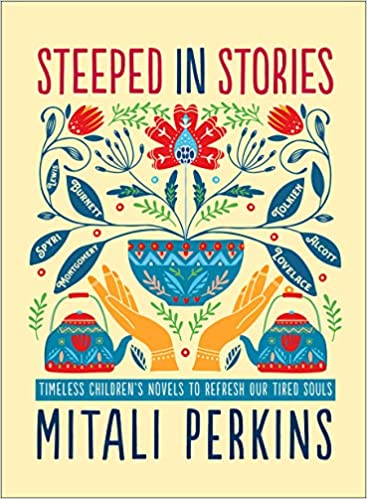Steeped in Stories: beautifully written, a lovely examination of children’s literature, but ends with a lecture on racial power.
Pros of Steeped in Stories:
Mitali Perkins is an engaging storyteller and the champion that children’s classics need in this era. While some of her perspectives are very different from mine (she embraces feminism, while I call myself a recovering feminist; she liberally quotes Pope Francis, while I’m more likely to quote the Protestant Reformers), I think she offers excellent guidance in certain areas. I, too, have struggled while thinking through how to present some classics to my children.
The “no good Indian but a dead Indian” idea of the settlers in otherwise lovely and sweet Little House on the Prairie; the incredibly racist passages of Dr. Doolittle (even as a small child I was shocked by this!); the snooty classism and racism displayed by many characters in many older novels are all attitudes I’d rather my children not ever encounter. And yet they are part of our history. Ms. Perkins talks about how she dealt with Mrs. Lynde’s bias against adopted children when reading Anne of Green Gables to her own, adopted sons. She simply asked them if they thought Mrs. Lynde was a good person. Her 9-year-old children were able to see that a secondary, biased character’s negative perceptions weren’t the same as the author’s own intent.
I so enjoyed Mrs. Perkins’ linking of virtues with the journeys of characters from so many of my own childhood favorites. (It felt like reading KS Prior’s On Reading Well, only for children’s literature.) I’ve been enjoying YA literature lately, and her unabashed celebration of the hope expressed in great books for children reignited my own love for them.
While you may not agree with everything Mrs. Perkins writes, I believe all lovers of children’s literature can enjoy and profit from the book discussions in Steeped in Stories.
Cons of Steeped in Stories:
I will try to keep this brief and charitable, knowing that we all have differing perspectives and that the author probably meant well.
Primarily, I was uncomfortable with the author’s use of the word “power” in her chapter, “See the Flaws, Seek the Virtues.” For instance, as a writer of fiction, Mrs. Perkins decides whether she’s the best person to write a story about a protagonist by measuring “the power gap between us” (208). The use of power as the measure of worth or validity, even if it’s attempting to rectify wrongs, ignores the fact that a beautiful life that receives great reward in heaven may not wield much power on earth. Also, not all white males or educated females are inherently more powerful than their counterparts.
I appreciate Mrs. Perkins’ stance that white tropes exist just as minority tropes do (a trope is a stereotypical caricature rather than a character). And, as a writer, I can learn from her advice about avoiding such mis-characterizations. But a sentence such as, “powerful voices have commandeered stories about people with less power” (210) assumes that people should only write about people like themselves. (Even though the author tries self-consciously to argue against this very assumption.)
As a writer, I felt as though I was in a tug-of-war. “You should write about more diverse characters! Write to empower the powerless! But you can’t try to write about anyone who might be perceived as much less powerful than you!” I emerged from the ending chapters feeling discouraged and hopelessly confused, having lost the joyous spirit with which I read the earlier chapters.
Favorite Quotes from Steeped in Stories:
In spite of my own discouragement and disagreements with Mrs. Perkins’ implied assumption that power is more important than the virtues she lauds, I don’t regret having read the book. I think her advice will stay with me as I present flawed classics to my own children. And I will try to give her grace as she attempts to have grace for other writers. Here are some quotes that I enjoyed from Steeped in Stories:
“The problem is that chasing after luxury, desperately pursuing success, and expressing our emotions without self denial results in a life marked by restlessness, envy, and discontent” (135).
Mitali Perkins
About authors from times past:
“Now we can see how their eras shaped them, how they were biased and mistaken, but also that their wisdom might help us resist our own era’s crushing and molding of the soul” (216).
Mitali Perkins



 : a favorite place to walk when we can!
Once
: a favorite place to walk when we can!
Once 
![The first photos are of my parents’ sprawling rural Arkansas garden. The last is of my tiny little beds in the big city. Plants bring life to even the smallest corner!
I’ve been reading some beautiful fiction this year, and I just posted a review of a book by one of my favorite authors, Leif Enger. (https://therestfulhome.com/brave-young-handsome-review/ in your browser, or click on the link in my Instagram profile) If you don’t have time to read the book, though, here’s just a quote or two for your enjoyment:
🎼
“Death arrived easy as the train; [he] just climbed aboard, like the capable traveler he was.”
🛤️
On riding a horse: “You are a feeble and tenuous being; the only thing a horse wants from you is your absence.” 🐎 😄
#quotes #leifenger #amreading #gardens #gardening](https://scontent-atl3-1.cdninstagram.com/v/t39.30808-6/468657020_18342474787176025_4442629541396867851_n.jpg?_nc_cat=108&ccb=1-7&_nc_sid=18de74&_nc_ohc=DEja6UP2ct4Q7kNvgEYJxCM&_nc_zt=23&_nc_ht=scontent-atl3-1.cdninstagram.com&edm=ANo9K5cEAAAA&_nc_gid=AA4bBsvQ_JpqZXLUPUTpTC8&oh=00_AYCjI9LUx-cJxe6cu0n7H1Gounaz92aBlTrQacnKut8umg&oe=67567CAB)
















